Freedom of navigation, the idea that the waters of the world should be open to all, is America's oldest and most consistently held foreign policy position. Even before the Constitution was written, trouble flared on this front, as the Barbary States in North Africa had a habit of taking passing ships and holding them for ransom. Previously, American vessels had been protected by the RN, but with that shield gone, other means were required. Morocco was dealt with via a treaty that is still in effect, but the other Barbary states were less willing to deal, and in the 1790s, Algeria began to seize lots of American ships. Congress responded by authorizing the creation of a Navy (the Continental Navy having been disbanded after the Revolution) and the construction of six frigates. But before any could be completed, the matter was settled by briberydiplomacy, and things quieted down in North Africa for a decade or so.
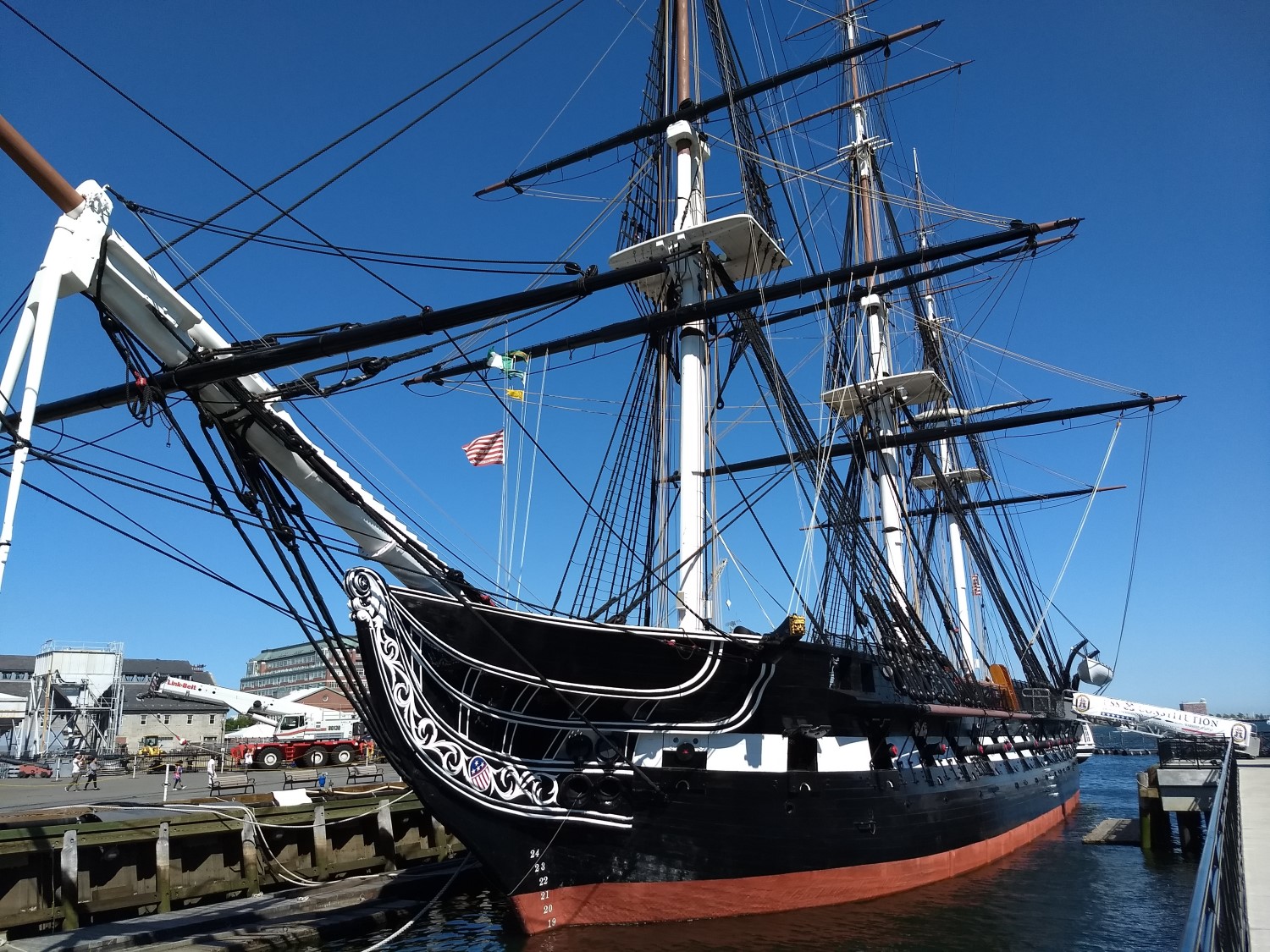
But it was hardly a solution to all of the problems faced by American ships in the waters around Europe. France had seen the American Revolution and decided that it looked like fun, but that it needed more chaos and bloodshed. The rest of Europe decided that they should nip this in the bud, and declared war. The Americans were still reasonably pro-French thanks to their help during the Revolution, but the new French government quickly squandered a great deal of this goodwill by handing out privateering commissions to American ships and sending prizes into American ports for condemnation, greatly increasing tensions between the US and Britain. Both sides did their best to attack the other's commerce, even in American vessels, and for a while it was unclear whether the US would go to war with France or Britain over the matter, until Britain signed the Jay Treaty in 1794, agreeing to withdraw from the remaining forts in the new nation's territory in exchange for the Americans agreeing to allow seizure of ships carrying goods to hostile ports in Europe. This was a significant departure from the traditional position of "free ships, free goods",1 and the French responded by essentially declaring open season on the American merchant marine.
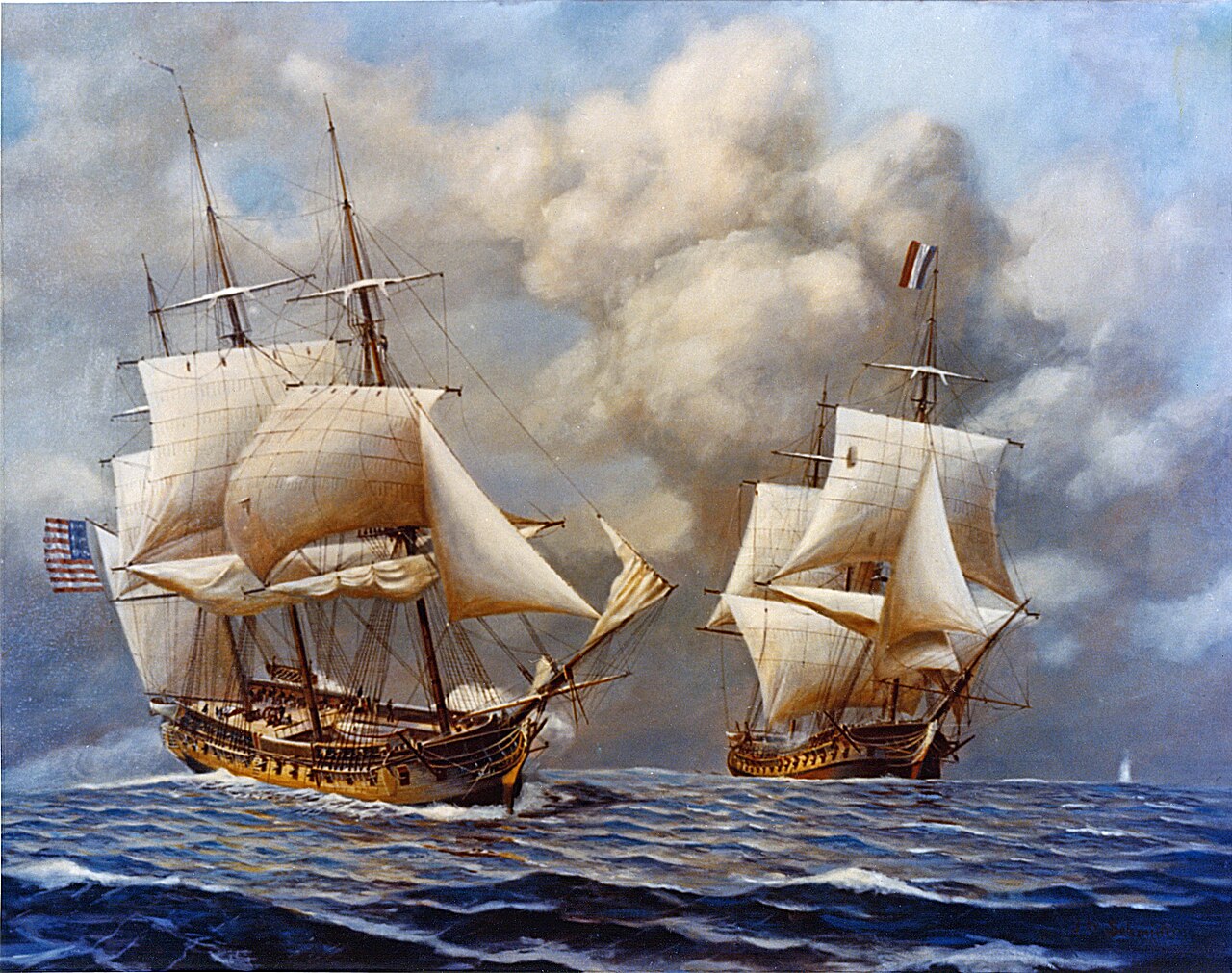
Constellation battles La Vengeance
French raiders took over 300 merchant ships in the nine months from October 1796 on, and diplomatic attempts to resolve the issue failed when the French tried to demand bribes as a prerequisite for talks. The Americans were outraged, and in April 1798 established the Department of the Navy, adding armed merchant ships to the frigates now nearing completion. By the end of the year, 21 warships would be in service and operating against the French, and they quickly took their toll on French privateers operating out of the West Indies. Notable was the schooner Enterprise, second of that illustrious name, which captured eight privateers and liberated 11 American ships that had been taken as prizes. The ability of the French to respond was limited by the British blockade, and only a few frigates reached the western Atlantic. Constellation was the only one of the American frigates to come to grips with them, first capturing L'Insurgente in early 1799 and then battering La Vengeance in an indecisive duel a year later.
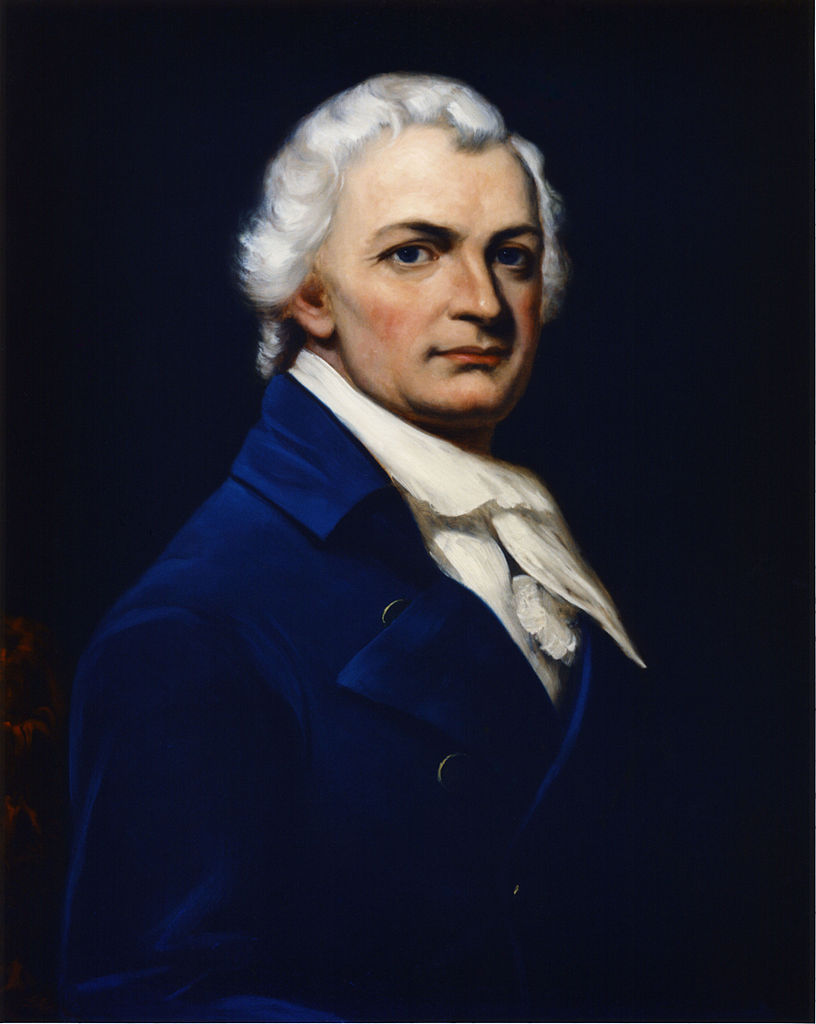
Benjamin Stoddert
In 1799, a young general by the name of Napoleon Bonaparte overthrew the French government, and he quickly decided that the so-called Quasi-War was one war too many. Negotiations began soon after, although the treaty wasn't finalized until September of 1800, normalizing relations between the two powers and allowing trade to resume. One notable result, thanks to the efforts of outgoing president John Adams and Secretary of the Navy Benjamin Stoddert, was that unlike after the Revolution, the Navy wouldn't be sold off at the end of the war. Instead, a number of ships would be retained, some of them in full commission. This would prove a wise move, as reality quickly collided with the Democratic-Republican Party's agrarian opposition to naval expenditure.
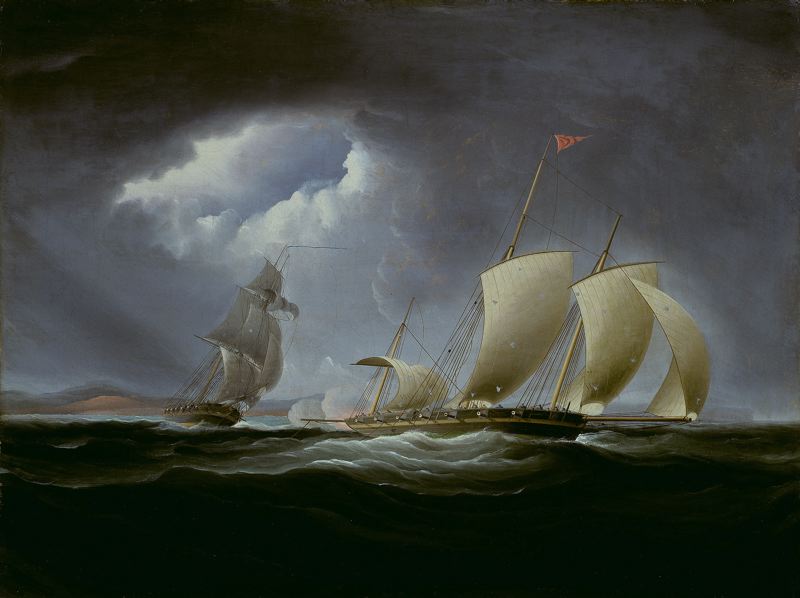
Enterprise pursues Tripoli
The theater was the Mediterranean, as some of the Barbary states had grown dissatisfied with American bribestribute and demanded a substantial increase. In May of 1801, Tripoli2 declared war on the United States, chopping down the flagpole of the American consulate in the traditional manner. Thomas Jefferson, torn between party principles and his own views on the need to safeguard trade, eventually chose the sensible option, and dispatched a four-ship squadron to the Mediterranean to deal with Tripoli. They quickly made their presence felt, with Enterprise defeating the imaginatively-named Tripoli, despite the pirate ship feigning surrender three times to lure her in close. As the US had not officially declared war, Tripoli was released instead of being taken as a prize, but shortly thereafter, Congress gave the President authorization to act as if a state of war was in effect, and more ships were dispatched. Unfortunately, the commander of this force, Richard Morris displayed a complete lack of urgency, and all of 1802 and half of 1803 passed before Jefferson worked this out and replaced him with Edward Preble, who moved swiftly to blockade Tripoli.

Decatur and his crew flee from the burning Philadelphia
Unfortunately, three weeks into the blockade, things went horribly wrong. The 38-gun frigate Philadelphia hit an uncharted reef while chasing a blockade runner and ran hard aground. Despite the efforts of her crew to get her off, she was stuck fast, and as the Tripolian gunboats closed in, her crew attempted to destroy everything of value, then struck the colors. The crew was enslaved and forced to help refloat the ship the following day. The Americans were obviously unhappy that one of their warships had fallen into enemy hands, and three months after Philadelphia's capture, a plan was hatched to deal with the problem. A captured local vessel, renamed Intrepid and under the command of Lt. Stephen Decatur, was sent into the harbor. The Tripolians were fooled, and as soon as they tied up alongside Philadelphia, Decatur and his men burst forth, overwhelming the pirates aboard the ship. As the frigate was unseaworthy, they left her a blazing inferno and withdrew, having suffered only one man wounded in the entire operation. The operation was hailed not just within the United States, where Congress promoted Decatur to Captain at the age of 25, but also in Europe.
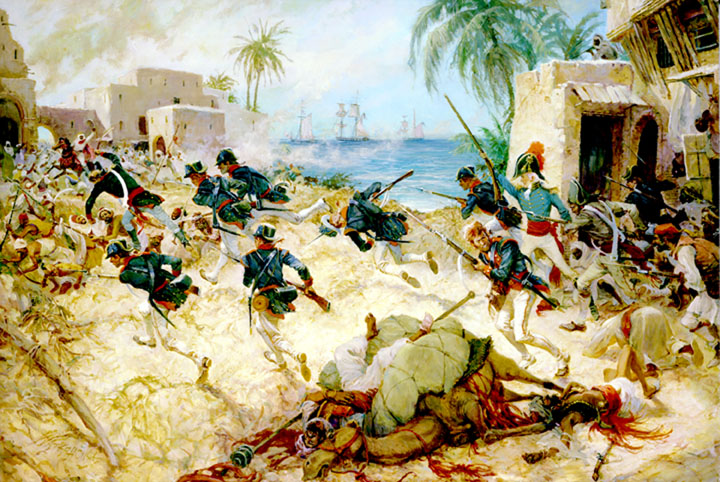
The Marines attack Derna
The American blockade of Tripoli continued throughout the first half of 1804, but Preble eventually grew bored of waiting, and launched a series of attacks into the harbor which culminated in the use of Intrepid as a fireship loaded with gunpowder, which badly damaged many of the Barbary ships. But Tripoli refused to come to terms, despite the arrival of additional American warships, and the Americans turned to Hamet, the deposed older brother of Pasha Yusef, to end the problem once and for all. Hamet had fled to Egypt, and was offering peace in exchange for American support in reclaiming his throne. The Americans agreed to provide supplies and cash, as well as eight Marines3 and two midshipmen, while Hamet was able to round up several hundred local soldiers of various descriptions. The combined force, led by William Eaton, the American consul to Tripoli, marched on Derna, in what is now eastern Libya, capturing the city in May 1805 with support from the ships offshore. The active ground campaign against his rule prompted Yusef to offer terms, releasing his American prisoners and promising not to attack American shipping going forward in exchange for $60,000 and the Americans persuading Hamet to go back into exile.
But France and the Barbary Pirates were far from the only threat to free trade, and even as Tripoli was dealt with, another threat was appearing. The United States would go up against the ruler of the seas to preserve free trade, and then get around to dealing with the Barbary Pirates once and for all. We'll pick up that story next time.
1 Essentially, neutral ships could only be seized if they were carrying contraband to a belligerent. Things like food and general goods were supposed to be exempt from seizure in neutral vessels, but this was an early example of Britain bending international law to allow a blockade of a European enemy. ⇑
2 The one in Libya, not Lebanon. ⇑
3 Yes, this is where the line "to the shores of Tripoli" in the Marine Hymm comes from. ⇑

Comments
In fact, one could argue the American commitment to open seas predates the country. The British decision to begin enforcing the Navigation Acts helped precipitate the Revolution.
RE: "America’s oldest and most consistently held foreign policy position." I wonder if the US was in a unique position in this respect? We were in the odd position of having started off part of the world maritime power, and then suddenly achieved independence, with no real navy to protect our large merchant fleet. Of course we were in favor of peaceful maritime commerce, it's not like we had any alternative.
Other countries had the option to be mercantilist, piratical, or totally avoid the seas all together. The US never had that option. It was either free-trade, or die, right from the start.
There is also the lack of a Thrace or Sealand sitting on the throat of a rival's sea access.